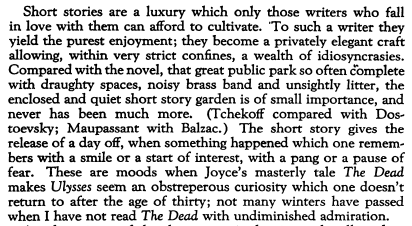Rhys Davies

The books in the photograph above contain most of the collected short stories of the Welsh writer Rhys Davies (1901–1978). Some others were, early in his career, published singly in limited editions: I have a few of those too. Possibly there were more besides which only ever appeared in periodicals, and which remain uncollected. Not shown are the Selected Stories of 1945, the Collected Stories of 1955, nor any of the posthumously-published editions of his tales. He is reckoned to have turned out about a hundred short stories and twenty or so novels over the forty-odd years of his writing life.
That life began, the story goes, after he’d left Wales for London and had found work in a suburban clothing store. One weekend he happened to pick up a copy of a literary quarterly called The New Coterie at a bookshop, and, reading the stories within, felt he could write just as well. Putting pen to paper on a wet Sunday afternoon, his first three tales “seemed to pour out like the rain”. These first attempts were accepted for inclusion in the next New Coterie, and, together with a few others, were published in 1927 in a slim paperback volume The Song of Songs. The same year saw the appearance of Davies' debut novel, The Withered Root.
Eight further full-scale story collections followed. My own favourites among them are Love Provoked (1933), the volume where I feel he first exhibited full mastery of the form; and A Finger in Every Pie (1942), the first of his collections I read, and a book I enjoyed so much it got me started on seeking out all the others. Not that I dislike the rest by any means: A Pig in a Poke (1931) may have some rough edges, but also a great deal of charm; and if The Darling of Her Heart (1958) plays it safe at times with some soft-focus nostalgia, there are more forceful moments too. A contemporary praised Davies as ‘The Welsh Chekhov’, which I feel is overstating his case: he couldn’t match the Russian’s depth; but I nevertheless prefer my compatriot’s writing over that of Anton Pavlovich. I’ve had less success with Davies' novels but have only read a few of those to date.
Described by one profiler as “a small, neat, darkish man with a bird-like face and quick eyes”, he hailed from the South Wales Valleys, then a major coal-mining centre. Despite leaving for London as a young man, Welsh settings predominated in his fiction for decades thereafter: whether in realistically-drawn tales of miners and their families from his industrialised home turf; or in stories set in a more or less idealised vision of rural West Wales. Some of the best entertainment in his fiction comes from his vividly-drawn (and frequently headstrong) female characters, from the downtrodden Mrs. Rees in ‘Nightgown’ and her dogged determination to bring one feminine comfort into her harsh life; to the witchy Sian Shurlock in ‘Over at Rainbow Bottom’, suspiciously-often a widow.

Davies was gay - albeit determinedly closeted - with (reputedly) a particular fondness for military men. There are hints as to his orientation here & there throughout his books, but only very seldom did he approach the subject of homosexuality more directly, such as in the stories ‘Doris in Gomorrah’, ‘Queen of the Côte D’Azur’ and ‘Wigs, Costumes, Masks’. Interestingly, none of these three appear in the 1955 Collected Stories, which gathered together about half of his stories written up to that point. In his brief Preface for the book, he wrote that the pieces included “yield me various degrees of satisfaction” while those omitted “cause me various degrees of unease” - an unease that may in some instances have had an extraliterary dimension.